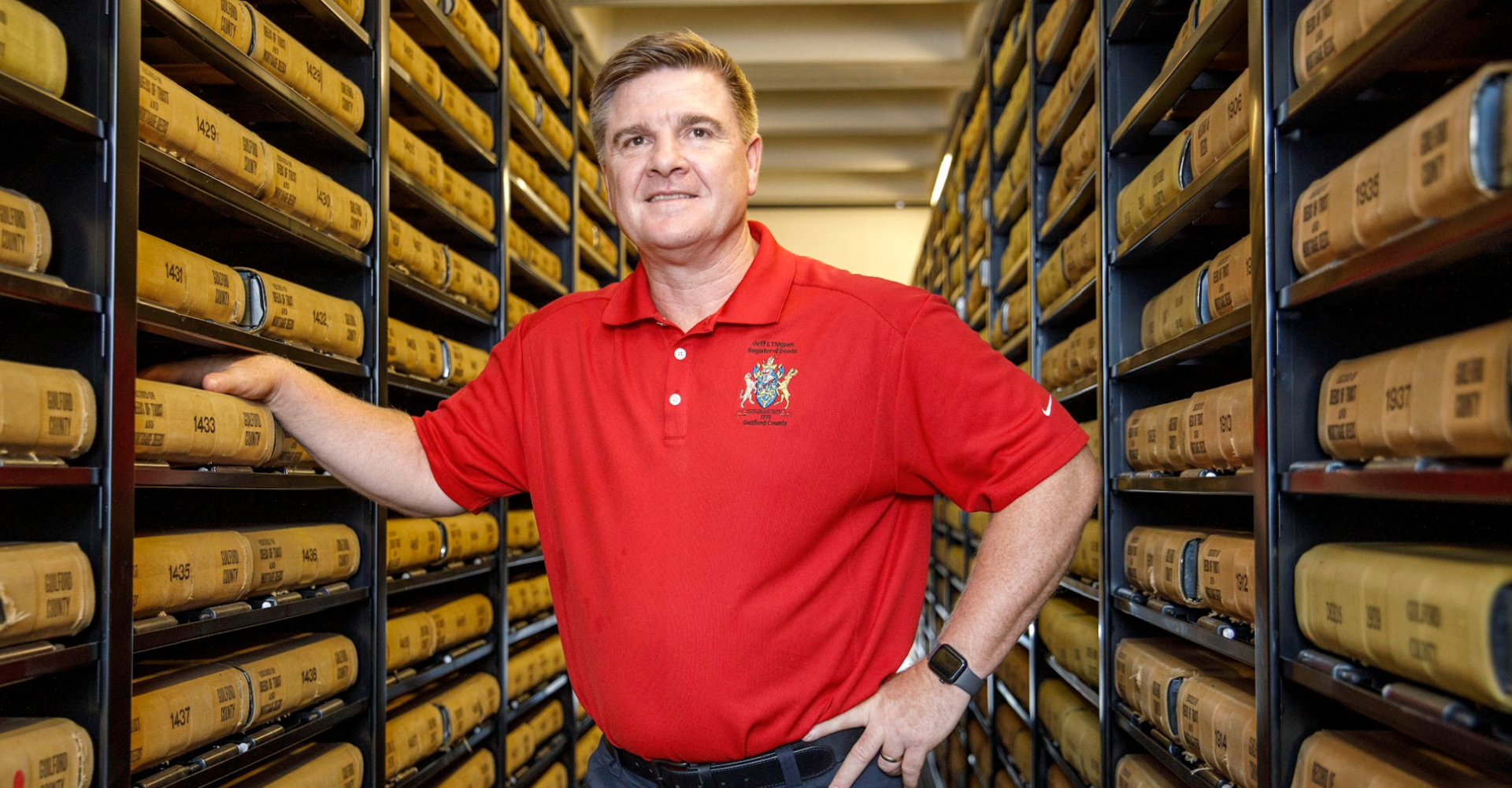
Jeff Thigpen '93, Guilford County's Register of Deeds, is one of thousands of Guilfordians working in public service.
In this political season, the spotlight shines bright on our elected officials, two in particular. Yet just beyond the light, it’s the work of countless civil and public servants, deeply committed to serving others.
Guilfordians have made careers out of public service for generations. Working as a politician, teacher, firefighter, bus driver or nurse – is more than just a job. Theirs is a vocation. Take a look at these Guilford public servants. They are patriots masked in their humility. They represent the best of Guilford and America.
To understand why Jeff Thigpen ’93 has spent the past 26 years in public service — the last 20 as Guilford County’s Register of Deeds — requires a road trip to Burgaw, an old railroad and farming town in eastern North Carolina where he spent his childhood.
Jeff was five years old when his father lay bleeding next to a barn door, tangled up in a two-ton combine harvester that had ripped his left leg off. Thomas Thigpen would spend the next 314 days in a hospital and another year in physical therapy. He would never work on a farm again.
Shortly after his father came home from the hospital, Jeff’s mother, Geraldine, lost her vision for nearly a year. Between his father’s surgeries and skin grafts, his mother’s blindness and the mounting medical bills for both of them, a rare constant in Jeff's life was watching a community come together for one of their own.
Even now, all these years later, Jeff shakes his head at the memories of so many who stepped up. “I still have these vivid images of my family’s picture on the coin cup filled with money at the convenience store. I remember neighbors who worked with us on the farm, white and Black, working class and dirt poor people coming to sit with us and bring food,” he says.
“Guilford taught me about the value of community and how power works and the importance of integrity, the idea of seeking truth, and what does that mean, when you're dealing in situations where people disagree? How do you bring your best self to civic discussion and dialogue? That whole idea of consensus building is really hard and forces you not just to think about what you want, but think about what you want within the context of a broad community of people that may not always agree on things."
Tom and Geraldine had purchased a home a few months earlier, and after the accident local civic clubs stepped in and helped pay the mortgage. “What’s great about communities is how everyone comes together to help someone in need,” says Jeff. “Not just your friends — strangers, too. A lot of different people and unlikely people came together for us, maybe even saved us. So when I see that today in other families struggling, I’m drawn to helping them.”
That sense of community and his four years at Guilford drive Jeff as Register of Deeds. Guilford, says Jeff, helped open his mind — not just to understanding the answers to problems but understanding the right questions to ask about a situation.
“Guilford taught me about the value of community and how power works and the importance of integrity, the idea of seeking truth, and what does that mean, when you're dealing in situations where people disagree?” he says. “How do you bring your best self to civic discussion and dialogue? That whole idea of consensus building is really hard and forces you not just to think about what you want, but think about what you want within the context of a broad community of people that may not always agree on things. It’s important not to forget what we agree on when we're dealing with disagreement. That's something that's going on in society right now that we're struggling with.”
That mindset served him well in 2014 when same-sex couples showed up at his office to apply for marriage licenses as part of a national campaign to protest the ban on gay marriage. A year earlier, North Carolina voters had approved Amendment One, which defined marriage as between a man and a woman.
The couples hoped Jeff would follow the lead of a Pennsylvania registrar issuing same-sex marriage licenses in defiance of his state’s ban because he believed the law there was unconstitutional.
Jeff, a fervent supporter of gay marriage, turned down his constituents. “I told them what I believed and what the law was were two different matters and that we needed to abide by the law,” he recalls. Two years later, when a federal judge in Asheville, N.C., overturned North Carolina’s ban on a Friday afternoon minutes after his office had closed, Jeff rushed into action. He reopened his office and asked his staff to come back to work to marry the couples, many of whom had been gathering outside his office. Some of the staff objected for religious reasons. Rather than force them to their jobs, Jeff gave them other work that needed to be done.
Jeff was one of only three North Carolina registrars to open their doors that night to serve. By the time he closed his office, 24 couples were married and the images of Jeff’s office marrying same-sex couples made national news.
Jeff shrugs it off. “I never thought there was any other way to handle that situation,” he says. “What I did then and now in my job I can draw a straight line back to a tobacco field in Burgaw.”
Jeff, who studied Justice & Policy Studies and Political Science at Guilford, says he has no inclination to seek higher office. That old chestnut about local government is where the rubber hits the road still speaks to him.
“Whenever you don’t have a strong, thriving local community of support, people start to lose a sense of not just themselves but the community around them. I’m called to right where I am today to help build that community right here,” he says.
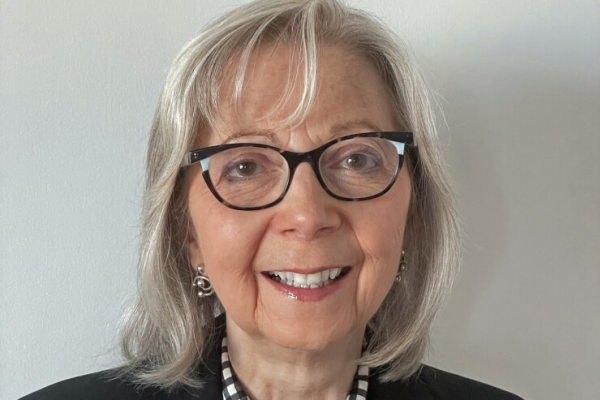
Ronnie Lowenstein crunched numbers, not politics
Talk about job insecurity. In 1998, New York City Mayor Rudy Giuliani told anyone who would listen that a public-private effort to build a new Yankee Stadium on the west side of Manhattan would save taxpayers millions of dollars rather than building one in the Bronx.
That’s when the city’s Independent Budget Office, led by Director Ronnie Lowenstein ’73, started crunching the numbers.
“I want to leave the world better than I found it. Isn’t that why a lot of public service workers do what they do?"
In the end, Ronnie’s office had to — how do we say this nicely? — publicly correct the mayor on his math. After Ronnie's office released its report, a new Yankees Stadium was built across
the street from the old one in the Bronx.
A few years earlier, when the mayor’s office boasted per-pupil spending in city schools was up, it was Ronnie’s office that had to — ahem — point out publicly that wasn't actually correct.
In fact, spending, when adjusted for inflation, was actually down, according to a report released by Ronnie’s office.
“Those were not messages the mayor’s office wanted out there, but that was not my concern,” says Ronnie, who spent 19 years as director of the IBO, which provides nonpartisan budget, economic and policy analyses to New York’s elected officials and
taxpayers.
“Politicians didn’t always agree with what we reported, and they let us know it. Sometimes in very public ways,” she says.
That public pressure never deterred Ronnie or her staff. Her career with the IBO covered four mayoral administrations before she retired in 2022. By then, she says, the anger and vitriol from politicians grew into respect and trust from city officials and taxpayers alike.
The city’s IBO was modeled after the nonpartisan Congressional Budget Office, which provides fiscal answers to federal lawmakers. After serving as an economist with the Federal Reserve Bank of New York, Ronnie joined the IBO when it was created in 1996. Two years later she took over as director. One of her first acts was to change her party registration from Democrat to independent to emphasize her neutrality.
“Did I have political beliefs?” asks Ronnie, not waiting for an answer. “Of course I had opinions, but I made sure to put those aside at work. I made sure my staff did, too.”
An Economics major at Guilford, Ronnie earned a master’s in Economics at Columbia University. She could have easily found a private, six-figure position in banking, but chose a road less taken. “I realized my skill sets could help me in public service with a lot of issues I cared about,” she says.
Two of those issues were public education and affordable housing. “I want to leave the world better than I found it,” says Ronnie. “Isn’t that why a lot of public service workers do what they do?
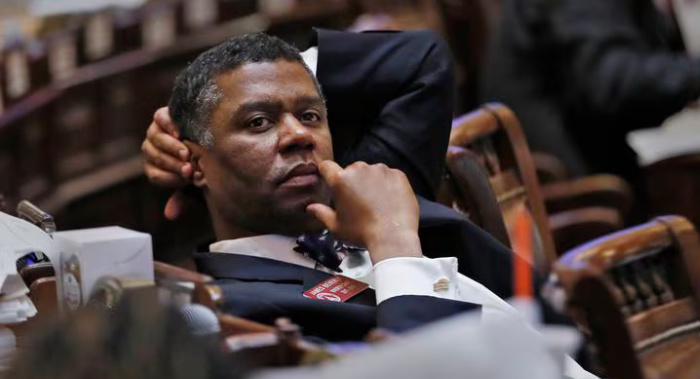
A trip to the pool forever changed James Beverly
When he was 5, James Beverly’s ’90 mother surprised him one summer morning by taking him from the family’s largely black neighborhood in Baltimore to a mostly white neighborhood across the city for a morning of swimming. It was maybe a 10-minute drive, but to James the new neighborhood was a world away.
“It’s the best feeling in the world when you’re able to be part of change that helps improve someone’s life.”
“It wasn't just the pools,” James recalls. “There were parks and trees and restaurants – things we didn’t have back in my neighborhood.” Fifty years later, the image is no less crisp for residing on the edge of his memory.
“I remember thinking, ‘What is this? Why don’t we have the same things, the same amenities they have in South Baltimore?’ From there on I became animated with this sense of how do we – not just I – but how do we help those who really need our help?”
For 12 years as a Democratic state legislator in Georgia, the last four as House Minority Leader, James, an optometrist from Macon, Ga., who earned a Biology degree at Guilford, worked tirelessly to help improve the lives of not just his constituents back home, but across the state.
“It’s the best feeling in the world when you’re able to be part of change that helps improve someone’s life,” says James.
In March, James announced he would not seek re-election. The decision was driven in part by a redrawn district that introduced new territory but also because he believes he can do more back in his hometown as a private citizen.
He encourages others to get involved in public service, politics in particular. “It changes you,” he says. “You knock on enough doors and hear people’s hopes and dreams and aspirations, that changes you. For years I'd walk down streets, make phone calls and listen.
Those people’s stories? Their dreams and desires? Working for them made me a better human being because it took me out of myself and focused me on them. For a period of my life, I had a chance at public service at a very high level and it changed me into a better human being.”
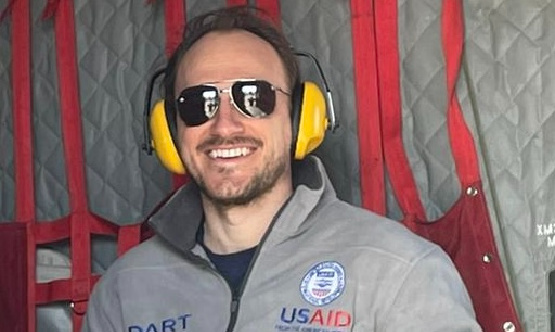
Jason Meisner feels at home helping others displaced from theirs
Jason spent most of his childhood overseas. His father was an agronomist and his mother a teacher with American International School. “I saw how much they gave to others,” says Jason. “Over the years I guess that service became a part of me.”
These days, after graduating from Guilford with a double major in Peace & Conflict Studies and Political Science, Jason is a Foreign Officer with the U.S. Agency for International Development. USAID is an independent agency of the government whose primary function is to administer civilian foreign aid and development assistance to distressed countries. He has worked in Iraq, Lebanon, and Somalia.
His work has also taken Jason to the Philippines to help after a typhoon slammed into the island in 2013, to the Turkey-Syria border after an 2023 earthquake left thousands homeless. Often that aid looks like cash, food, or shelter for the many who are in need.
Those short-term fixes are rewarding, but more fulfilling is when the advocacy work of Jason and other USAID Officers leads to long- lasting policy changes that impact people over their lifetime.
“That’s when our work leads to more permanent solutions,” he says. “That’s what makes the work even more satisfying.
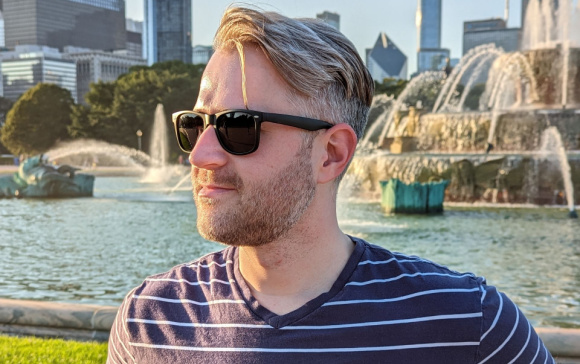
Overworked and underpaid, Jonathon Vogt loves his job
Jonathan Vogt '07 is an assistant prosecuting attorney in Cincinnati who handles nuisance litigation. His office takes on private and corporate landlords who shirk their duties. His salary is set no matter how many cases he is assigned. That number is growing.
But here’s the rub: Overworked, underpaid Jonathon wouldn’t have it any other way. “I’m proud of the work we do,” he says.
“When you’re able to take on a case that threatens people’s safety and the basic human right to have access to quality safe housing for themselves and their families, that’s something worth fighting for.”
“When you’re able to take on a case that threatens people’s safety and the basic human right to have access to quality safe housing for themselves and their families, that’s something worth fighting for.”
Jonathon says renters are often living paycheck to paycheck. “They certainly don’t have the resources to take on these companies,” he says. That’s what makes public service so rewarding for me.”
Jonathon started off a Theatre Studies major at Guilford before switching to Political Science. The last job he expected to be working at was public defender. Guilford changed that.
“The ideas I was exposed to, and getting to meet and live within such a diverse student body helped put me on the path to becoming the man and person I am today,” he says. "The professors — people like Provost Maria Rosales — inspired me to find out who I really am, find out what I am passionate about. I am extremely grateful."
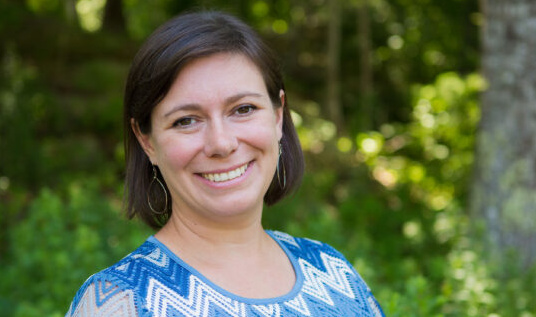
When her party called, Cameron Reny answered
Three years ago, when local Democratic party officials asked Cameron Reny ’07 if she was interested in running for a seat in the Maine Senate, she told them she needed to think about it. But not for long.
“You can make a really big difference no matter how much the odds are stacked against you. I like to think I’m still doing that today."
Cameron was raised in a family that believes in giving back to the community. “That means more than just writing a check for a cause,” she says. “You have to really roll up your sleeves and do the work and give your time and effort.”
Cameron won her seat in 2022 and is knocking on doors again this fall for re-election. In her first two years in the Senate, Cameron, who chairs the state’s Marine Resources Committee, sponsored and passed eight bills.
Her measures have helped remove red tape when filing mental health insurance claims, protected fishermen when they are injured or their boats break down during the fishing season and helped put more local seafood on the plates of school menus.
While studying abroad at Guilford, Cameron, a Community & Justice Studies major, and classmates worked with city officials in a small town outside Guadalajara, Mexico, to bring clean water to residents.
“That trip showed the power people can generate when they work together,” she says. “You can make a really big difference no matter how much the odds are stacked against you. I like to think I’m still doing that today."

